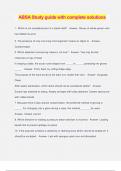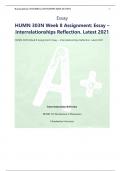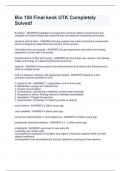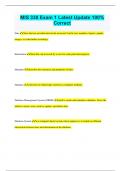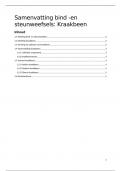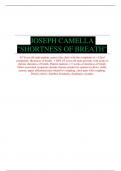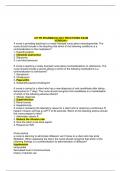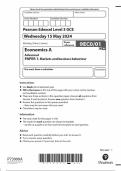Samenvatting
Samenvatting Alle stof Hogeschooltaal Engels C1
- Vak
- Hogeschooltaal
- Instelling
- Hogeschooltaal
Duidelijk overzicht van alle stof Hogeschool taaltoets Engels C1!
[Meer zien]Voorbeeld 4 van de 170 pagina's
Voorbeeld 4 van de 170 pagina's
In winkelwagenEnkele voorbeelden uit deze set oefenvragen
1.
Correct the sentence by putting the verb in brackets in the present simple. Delete the brackets. Write your answer in full and do NOT use short forms or contractions: This not only (is meaning) that we are unable to print the books as planned, but it also entails that we will not be able to deliver the orders on time.
Antwoord: This not only means that we are unable to print the books as planned, but it also entails that we will not be able to deliver the orders on time.
2.
Put the verb in brackets in the present continuous and the adverb in the correct place. Delete the brackets. Write your answer in full and do NOT use short forms or contractions: Thanks to these additional days off work this week, I (to get around to – finally) catching up with some extra chores around the house.
Antwoord: Thanks to these additional days off work this week, I am finally getting around to catching up with some extra chores around the house.
3.
Put the verb in brackets in the correct form using either the present simple or the present continuous. Delete the brackets. Write your answer in full and do not use short forms or contractions: My co-workers and I (to go out) after work every now and then. It is always great fun.
Antwoord: My co-workers and I go out after work every now and then. It is always great fun.
4.
Fill in the correct form of the present perfect: Can you call the customer and inform him that I ..... (to finish – not) repairing their motor cycle yet? My hands are covered in grease.
Antwoord: haven\'t finished
5.
Fill in the correct form of the present perfect: ........ (you – to compile) that list of possible blog topics yet? The copywriter needs it as soon as possible for his content planning.
Antwoord: Have you compiled
6.
Choose the correct answer to form the present perfect continuous: The blogger looks exhausted; she … twice as much content as usual for the past two weeks. Fortunately, she can take a holiday now. 1 has been published 2 has been publishing 3 have been published 4 have been publishing
Antwoord: 2 has been publishing
7.
Choose the correct forms of the past simple for emphasis: Mitchell and Damian worked hard to make the festival a success. Not only … all volunteers, but they also … merchandise. 1 did they recruit, designed 2 did they recruited, designed 3 recruited they, did design 4 they recruited, did design
Antwoord: 1 did they recruit, designed
8.
Fill in the correct form of the past simple or present perfect: From the start, we ..... (to regard) the health and contentment of our employees as vital to the success of our business and we still do.
Antwoord: have regarded
9.
Where should the adverb be inserted? [constantly]: Evy was reprimanded because [*] she [*] was [*] gossiping [*] about her colleagues.
Antwoord: between was [*] gossiping
10.
What is the correct option? I - just was watering / just watered / was just watering- the plants in the garden when it started to rain.
Antwoord: was just watering

Studenten hebben al meer dan 850.000 samenvattingen beoordeeld. Zo weet jij zeker dat je de beste keuze maakt!

Geen gedoe — betaal gewoon eenmalig met iDeal, creditcard of je Stuvia-tegoed en je bent klaar. Geen abonnement nodig.

Studenten maken samenvattingen voor studenten. Dat betekent: actuele inhoud waar jij écht wat aan hebt. Geen overbodige details!
Je krijgt een PDF, die direct beschikbaar is na je aankoop. Het gekochte document is altijd, overal en oneindig toegankelijk via je profiel.
Onze tevredenheidsgarantie zorgt ervoor dat je altijd een studiedocument vindt dat goed bij je past. Je vult een formulier in en onze klantenservice regelt de rest.
Stuvia is een marktplaats, je koop dit document dus niet van ons, maar van verkoper Noaveldmaat. Stuvia faciliteert de betaling aan de verkoper.
Nee, je koopt alleen deze samenvatting voor €4,99. Je zit daarna nergens aan vast.
4,6 sterren op Google & Trustpilot (+1000 reviews)
Afgelopen 30 dagen zijn er 65040 samenvattingen verkocht
Opgericht in 2010, al 15 jaar dé plek om samenvattingen te kopen
